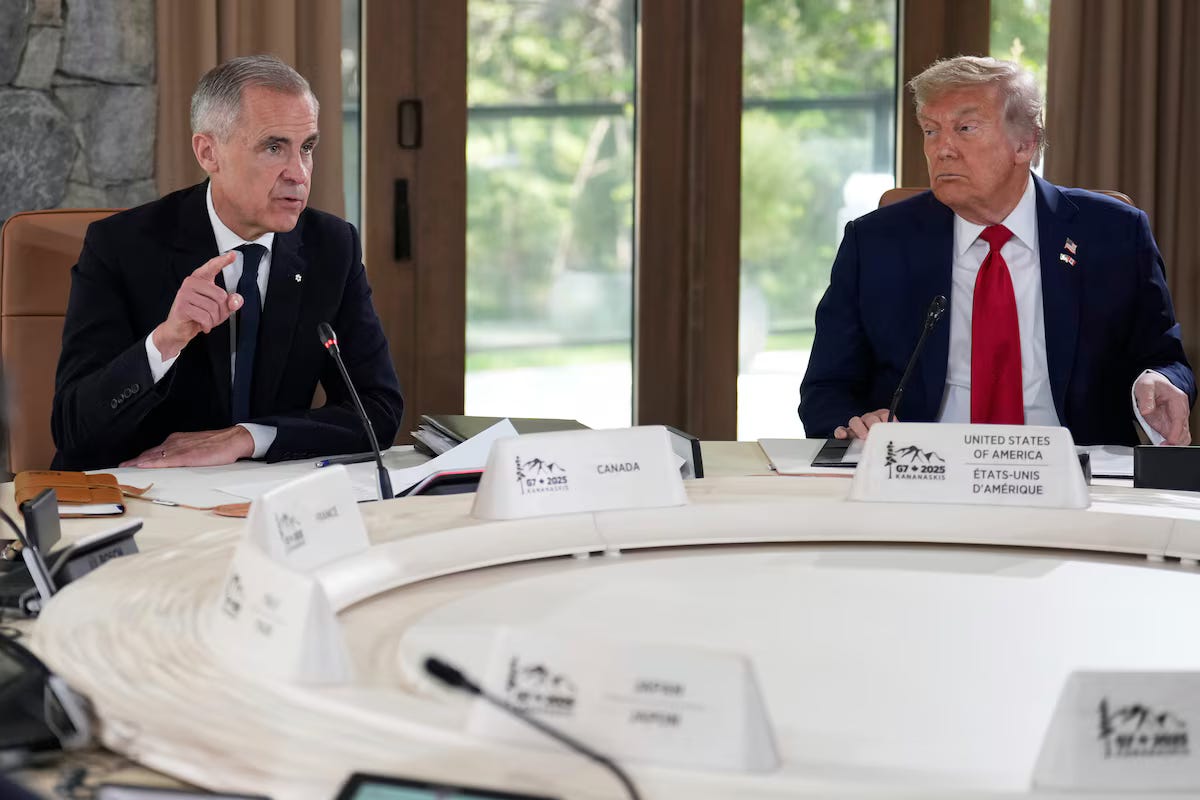For the First Time in My Life, I Found a "Cartel" I *Want* to Grow Stronger by Eliminating a Member
Let's quit wasting time stroking the ego of a supposedly "transformational President" and get some real work done for the benefit of everyone else involved.

I read an excellent opinion piece this morning by The Globe and Mail’s Andrew Coyne, in which he argued in favour of reducing the G7 to the G6:
No, what made this year’s meeting of the G7 utterly absurd was that Mr. Trump shares none of the G7’s declared aims. It is not merely that he disagrees with the consensus on this or that item on the agenda, or that he prefers a different route to a broadly shared aim.
He is fundamentally opposed to everything the G7 stands for, including the G7: the very idea of independent nations attempting to work together for the common good – as opposed to major powers doing whatever they like – is anathema to him.
The rest of the G7 are for liberal trade; Mr. Trump is against trade, or at least imports. They are for macroeconomic stability; Mr. Trump is for deficits without limit. They are for the collective defence of the democracies, and in particular for the defence of Ukraine. Mr. Trump is on the side of Russia, and the autocracies.
Basically, Trump is getting in the way of any progress the other members of the G7 can make, so it was actually a bit of a relief for other members when he left early, as suggested by the National Post’s John Ivison:
President Donald Trump headed back to Washington on Monday night, claiming he had “big stuff” to sort out in regard to the Israel and Iran confrontation.
It was a legitimate pretext, but the feeling is that he would have gone anyway. He was like the embarrassing uncle at the wedding who, to everyone’s relief, leaves early.
“I wish I could stay for tomorrow,” the president said, as Carney turned to French president Emmanuel Macron and winked.
Macron barely hides his belief that Trump is depriving a village somewhere of an idiot.
While thinking about what was written in these pieces — as well as other ones — it dawned on me that if we consider the G7 to be a “cartel” of governments, then I am actually in favour of making it stronger by eliminating a member, specifically the U.S.
I have often argued there is absolutely no net-benefit to society of a cartel, including De Beers, OPEC, and Canada’s government-mandated supply management system. But making the G7 “cartel” stronger by expelling the U.S. like it previously did Russia from the G8 — and perhaps adding other like-minded countries to the group — is something I can get behind.
To put it simply, cartels form because each individual firm (or government) wants to increase its “profits”, which in the context of governments can be seen as the well-being of their respective countries and its citizens, however that “well-being” is defined. The combined profits of the cartel are larger than their combined profits under competition because:
When they compete with one another, they do what is best for themselves, taking as given the actions of the other parties.
On the other hand, when firms (governments) form a cartel, they will take one another’s costs and benefits into account when making their own decisions.
A firm/government will only join a cartel if its expected gains outweigh its expected costs (legal and otherwise). This is why governments in the G7 have historically agreed to cooperate with each other: they expected to gain more from cooperation than they would if they chose to go it alone in the name of their “sovereignty”, or whatever else would motivate them to go it alone.
But this does not mean that the firm/government does not have an incentive to “cheat” on the cartel agreement. In the case of world governments, they have historically been motivated against cheating because they knew it would lead to a complete breakdown of the system. In other words, while cheating on their agreements with other world governments might lead to short-run “profits” at the expense of their partners, in the long-run they knew they would ultimately lose due to a complete breakdown of the international order.
That is, until Donald Trump came to power and went out of his way to denounce this international order. He clearly sees no benefit to the U.S. cooperating with other (democratic) countries, and would prefer to work with dictatorships like Russia and China. It is for this reason the G7 “cartel” is bound to collapse — or at least become significantly weaker — as long as its other six members have to “play nice” with him.
Therefore, if the U.S. is kicked out of the club, then the remaining G6 countries can concentrate their time and other resources to make mutually-advantageous agreements, rather than trying to get what they can while simultaneously stroking the ego of a supposedly “transformational President”.
Don’t get me wrong: in an ideal world, we would want the massively powerful U.S. government to be part of this international “cartel” because its inclusion can (and has) provided great benefits to all countries involved. But this is not an ideal world, and the net-benefits of working with it are in the past — at least until January 2029.
If the U.S. ever desires to return to being an adult in the room, then we can consider letting it back into the club. But until then, going our separate ways will make the remaining G6 much stronger, for the mutual benefit of all of these countries’ citizens.



